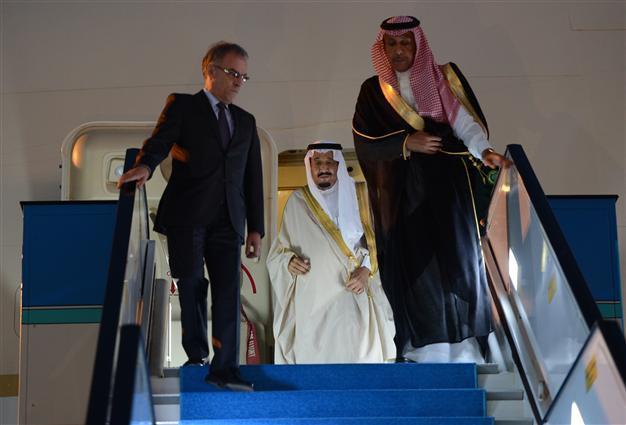Saudi king makes spectacular entrance to Antalya to attend G-20 Summit
ANTALYA

Saudi King Salman bin Abdülaziz el-Suud. AA Photo
Saudi King Salman bin Abdulaziz al-Saud was welcomed by a convoy of luxury cars on Nov. 12 to attend the G-20 Summit on Nov. 15-16 in Antalya, where 546 rooms have been booked for him.
Saudi Prince El Velid Bin Telal, Turkish Economy Minister Nihat Zeybekci, and Antalya’s leading civil authorities, were waiting to welcome the king to Turkey’s Mediterranean resort city, where he will stay at the exclusive Mardan Palace Hotel.
During his trip to the hotel, special security forces and local police forces took intense security measures to guard his convoy.
Some 400 luxury cars have also been reserved for King Salman, who is expected to stay in Antalya for over two weeks after the G-20 Summit.
One week before the Summit, the personal belongings of the Saudi king and the Saudi prince were transferred to the hotel in 16 trucks. A total of 65 armored Mercedes cars were also brought to the city for King Salman and his special guards.
A total of 546 rooms at the Mardan Palace Hotel have been reserved for the Saudi delegation headed by King Salman, at a cost of between 800 euros and 15,000 euros per night.
Red carpets were laid down in hallways in the hotel so that the Saudi monarch will not have to touch the asphalt when arriving at or departing from the hotel.
In an exclusive interview with state-run Anadolu Agency on Nov. 13, Turkish President Recep Tayyip Erdoğan said climate change, international terrorism and the economy will all be discussed at the Antalya Summit.
The Syria issue is also expected to be one of the main issues discussed.
Turkey’s G-20 presidency has focused on investment, inclusiveness and implementation of G-20 proposals.
The G-20 economies are committed to boosting global economic growth by an additional 2 per cent by 2018, which would boost the global economy by $2 trillion.
